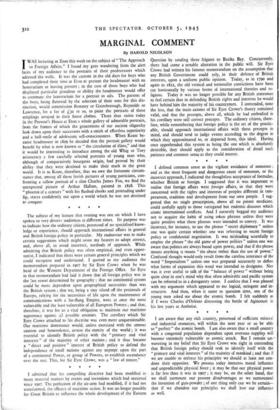I admitted that his compelling directive had been modified in
many material matters by events and inventions which had occurred since 1907. The perfection of the air-arm had modified, if it had not transformed, the efficacy of maritime action. It was no longer possible for Great Britain to influence the whole development of the Eastern Question by sending three frigates to Bezika Bay. Concurrently, there had come a notable alteration in the public will. Sir Eyre Crowe had written his famous memorandum on the assumption that any British Government could rely, in their defence of British interests, upon a uniform public opinion. Today, as in 1790 and again in 1822, the old vertical and nationalist convictions have been cut horizontally by various forms of international theories and re- ligions. Today it was no longer possible for any British statesman to feel certain that in defending British rights and interests he would have behind him the majority of his countrymen. I contended, none the less, that the main axioms of Sir Eyre Crowe's theory remained valid, and that the precepts, above all, which he had embodied in his corollary were still correct precepts. The ordinary citizen, there- fore, while remembering that foreign policy is the art of the practic- able, should approach international affairs with these precepts in mind, and should tend to judge events according to the degree in which they approximated to, or departed from, this ideal. Having once apprehended this system as being the one which is absolutely desirable, they should apply to the consideration of detail such patience and common sense as they could muster.


























 Previous page
Previous page